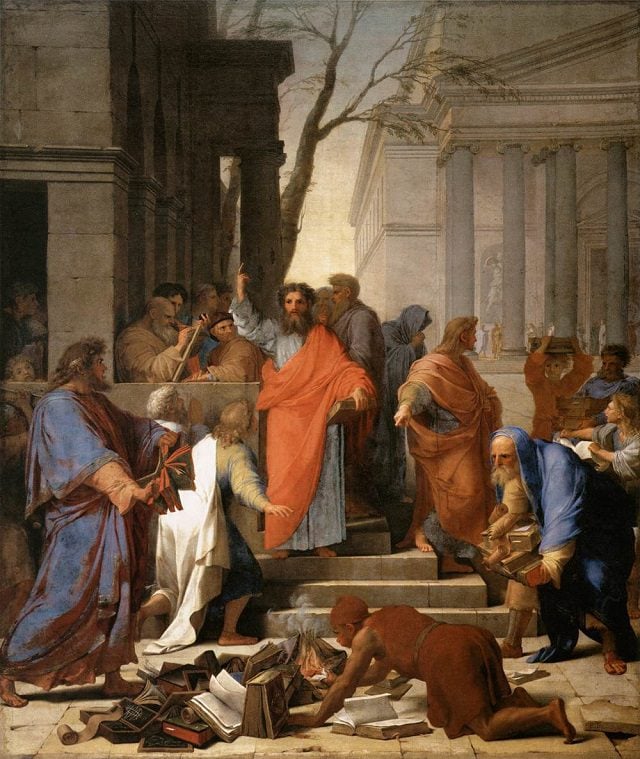
I ran across this post of 4-5-18 today on Bishop James “Dr.” [???] White’s website. It was written by an anti-Catholic Reformed / Presbyterian polemicist who goes by “Turretinfan.” I decided to make a rare exception to my policy (since 2007) of not debating theology with anti-Catholics, because this looked interesting and I thought it’d be fun to respond to. His words will be in blue.
2 Corinthians 1:21 (RSV) But it is God who establishes us with you in Christ, and has commissioned us;
2 Corinthians 2:17 For we are not, like so many, peddlers of God’s word; but as men of sincerity, as commissioned by God, in the sight of God we speak in Christ.
***
Jesus told his apostles to establish a church, not write a book, or so we are told by many of Rome’s apologists.
Technically, Jesus directly established His Church (Matthew 16), not the apostles. And our point is not that He said not to write any books, but that He didn’t commission the New Testament. His commands to proclaim the gospel were primarily (even overwhelmingly, I would say) in terms of oral preaching and oral tradition, not by means of writing (though that isn’t excluded).
It’s not that we’re opposed to the Bible at all. We canonized it and translated it and preserved it for fifteen centuries before Luther was a gleam in his father’s eye. It’s that Protestants pit oral tradition and an authoritative Church against the Bible, and we oppose that (because the Bible doesn’t teach it). And to do so, they will even distort the words of that same Holy Scripture, as we see here. Here are clear references to oral proclamation / tradition:
Matthew 10:7 (RSV) And preach as you go, saying, `The kingdom of heaven is at hand.’
Matthew 10:27 What I tell you in the dark, utter in the light; and what you hear whispered, proclaim upon the housetops.
Matthew 24:14 And this gospel of the kingdom will be preached throughout the whole world, as a testimony to all nations; and then the end will come.
Mark 3:14 And he appointed twelve, to be with him, and to be sent out to preach
Mark 6:12 So they went out and preached that men should repent.
Mark 13:10 And the gospel must first be preached to all nations.
Mark 14:9 And truly, I say to you, wherever the gospel is preached in the whole world, what she has done will be told in memory of her.
Mark 16:15, 20 And he said to them, “Go into all the world and preach the gospel to the whole creation. . . . [20] And they went forth and preached everywhere, (cf. Lk 9:2, 6)
Luke 24:47 and that repentance and forgiveness of sins should be preached in his name to all nations, beginning from Jerusalem.
Acts 5:42 And every day in the temple and at home they did not cease teaching and preaching Jesus as the Christ.
Acts 8:5 Philip went down to a city of Sama’ria, and proclaimed to them the Christ.
Acts 8:4, 12, 25, 40 Now those who were scattered went about preaching the word. . . . [12] But when they believed Philip as he preached good news about the kingdom of God and the name of Jesus Christ, they were baptized, both men and women. . . . [25] Now when they had testified and spoken the word of the Lord, they returned to Jerusalem, preaching the gospel to many villages of the Samaritans. . . . [40] But Philip was found at Azo’tus, and passing on he preached the gospel to all the towns till he came to Caesare’a. (cf. 9:27, 29)
Acts 9:20 And in the synagogues immediately he proclaimed Jesus, saying, “He is the Son of God.” (cf. 10:36-37, 42; 11:20)
Acts 13:5 When they arrived at Sal’amis, they proclaimed the word of God in the synagogues of the Jews. . . . (cf. 15:21, 35; 16:10; 17:18; 18:5)
Romans 1:15 so I am eager to preach the gospel to you also who are in Rome.
Romans 10:8, 14-15, 17 But what does it say? The word is near you, on your lips and in your heart (that is, the word of faith which we preach); . . . [14] But how are men to call upon him in whom they have not believed? And how are they to believe in him of whom they have never heard? And how are they to hear without a preacher? [15] And how can men preach unless they are sent? As it is written, “How beautiful are the feet of those who preach good news!” . . . [17] So faith comes from what is heard, and what is heard comes by the preaching of Christ.
2 Timothy 4:2 preach the word, be urgent in season and out of season, convince, rebuke, and exhort, be unfailing in patience and in teaching.
2 Timothy 4:17 But the Lord stood by me and gave me strength to proclaim the message fully, that all the Gentiles might hear it. . . .
Let’s shatter this rather transparent attempt to place a wedge between the Bible and the Church.
As explained, there’s no “wedge” on our end, but in the Protestant camp. We agree that the Bible is inspired, infallible revelation. We don’t agree that the Church and sacred tradition are not infallible.
Here is a simple way to do that, for the next time your “Catholic Answers” listening friend tells you this line.
1) Actually, Jesus did say “write in a book”
Revelation 1:11 says “Saying, I am Alpha and Omega, the first and the last: and, What thou seest, write in a book, and send it unto the seven churches which are in Asia; unto Ephesus, and unto Smyrna, and unto Pergamos, and unto Thyatira, and unto Sardis, and unto Philadelphia, and unto Laodicea.” Yes, I know this is a “gotcha” moment, but it better get their attention.
Absolutely. He did say this, but it applies only to the book of Revelation, not the entire New Testament (which was determined by Catholic tradition: as to what books made it up). The same tired sola Scriptura argument is made from words at the end of the book (“this book”: 22:9-10, 18-19; “the book of this prophecy”: 22:19; “prophecy of this book”: 22:7). Many Protestant apologists argue that that is referring to the book of the New Testament, but it clearly only applies to the book of Revelation. Nice try, but no cigar . . .
John 20:30 is similar, insofar as it also refers to “this book” (meaning, the Gospel of John only).
The only other time “books” are mentioned in this way, it refers not to 27 New Testament books (which are never referred to as such in the New Testament, but rather, for the first time in 367 AD by [the very Catholic!] St. Athanasius), but rather to hundreds or thousands of books (i.e., hardly a “proof” of sola Scriptura!):
John 21:25 But there are also many other things which Jesus did; were every one of them to be written, I suppose that the world itself could not contain the books that would be written.
When St. Luke described his decision to write his Gospel, He didn’t say that Jesus told him to do so:
Luke 1:3 it seemed good to me also, having followed all things closely for some time past, to write an orderly account for you, most excellent The-oph’ilus,
When St. Paul refers to his own teaching of the Thessalonian Christians, he places his oral proclamations on the same level as his written ones:
2 Thessalonians 2:15 So then, brethren, stand firm and hold to the traditions which you were taught by us, either by word of mouth or by letter.
2) Jesus alluded to them writing books
John 17:20 says “Neither pray I for these alone, but for them also which shall believe on me through their word…” Guess how people believe through the word of the apostles? For anyone reading this, and for most of history, that has exactly been through their word written in the books of the Bible. Don’t think Jesus didn’t know that would be the way.
The text doesn’t say that. What’s stated would include writing (I agree), but it doesn’t refer exclusively to writing. Turretinfan merely reads it into the text (which is eisegesis). “Word” in Scripture refers far more to oral preaching (including the utterances of the prophets) than to the written word, as even a quick search of “word” or “word of God” or “word of the Lord” in the New Testament will soon reveal beyond all doubt.
The remaining “arguments” he makes are so bad that they deserve no reply at all.
Bottom line: this is an exceedingly weak, unsupported argument, as are all biblical arguments utilized in the futile attempt to establish the false doctrine of sola Scriptura. All that has been proven is that Jesus gave a command to write one New Testament book (Revelation). Yeah, we agree. It proves nothing of what Turretinfan thinks it proves.
***
Photo credit: The Preaching of St Paul at Ephesus (1649), by Eustache Le Sueur (1616-1655) [public domain / Wikimedia Commons]
***













